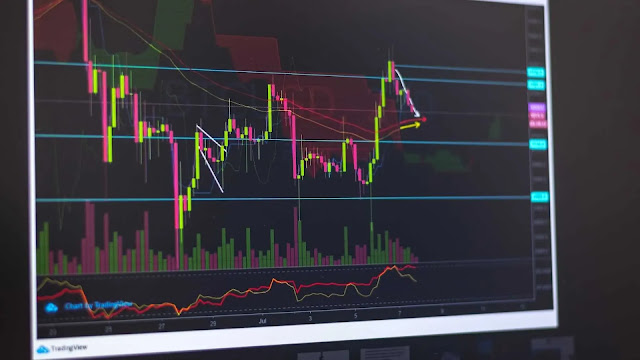The Brutal Truth: Why Trading is Often Harder Than It Seems?
Trading in financial markets holds a certain attraction, promising the chance to make money quickly. Many believe it's an easy route to wealth. However, there's a big misunderstanding here. Trading is far tougher than it seems.
The appeal of making fast profits makes people think trading is a simple path to success. This is where the problem lies. In reality, trading demands a lot. It's not just about clicking buttons and watching money flow in. This brings us to the main point: trading is much harder than it looks.
 |
| The Brutal Truth: Why Trading is Often Harder Than It Seems? |
In this article, we'll delve into why this is the case. We'll uncover the psychological challenges traders face, the technical expertise required, and the vital role of risk management. Moreover, we'll see how unpredictable factors like economic events and market shifts can throw off even the most skilled traders. So, buckle up as we explore the truth behind the alluring facade of trading.
"Trading is the Hardest Way to Make Easy Money."
The Illusion of Easy Money
Many people think that trading is like a magical path to quick riches. They believe that by buying and selling stocks or currencies, they can make lots of money without much effort. This idea is like a shiny illusion that can lead to big mistakes. How Trading Can Shape Your Life's Trajectory?
 | |
|
A. Misunderstanding Easy Gains
Many people are drawn to the world of trading with the enticing idea that it guarantees quick and effortless money. The belief that simply buying and selling assets like stocks or currencies can lead to instant riches is a common misconception.
B. Misleading Media Representations
The portrayal of successful traders in movies, television shows, and news articles often distorts the reality of trading. These media portrayals tend to depict traders as exceptionally gifted individuals who possess an almost supernatural ability to predict market movements accurately. Such depictions contribute to the mistaken perception that trading is an easy endeavor that can be mastered overnight.
C. Risks of the Quick Riches Mindset
Approaching trading with the mindset of achieving quick riches can have detrimental consequences. When one expects immediate profits without putting in the necessary effort, they are more prone to making hasty decisions driven by emotions rather than careful analysis. This approach disregards the need for comprehensive market research, risk management, and strategic planning.
D. Embracing Realistic Views
Acknowledging the complexity of trading is crucial to breaking free from the allure of easy money. Trading is not a stroke of luck but a skill that demands dedication, learning, and practice. Markets are dynamic, and success requires continuous adaptation and education. Shifting the perspective from a quick-rich mentality to an understanding that trading is a gradual learning process can pave the way for a more sustainable and informed approach.
Psychological Challenges
Trading isn't just about numbers and charts; it's also about managing your mind. Let's dive into the emotional rollercoaster that traders often face. Startup Success Blueprint.
 | |
|
A. Emotional Strain
Trading can be tough on your emotions. The ups and downs of the market can play tricks on your mind, causing stress, anxiety, and even frustration. It's like riding a wild rollercoaster, but instead of enjoying the ride, your hard-earned money is on the line.
B. Mind Games
Our brains aren't always our best friends when it comes to trading. Common psychological biases, like following the crowd or holding onto losing trades in the hope they'll turn around, can lead us astray. These biases can make us ignore logical thinking and rely on feelings, which isn't the best strategy.
C. Fear and Greed
Fear and greed are like two troublemakers in the world of trading. Fear can make us freeze and miss out on opportunities, while greed can make us take bigger risks than we should. It's like trying to walk a tightrope while juggling these two heavy balls.
D. Keeping a Steady Mind
E. Learning from Mistakes
Every trader faces psychological hurdles, even the pros. The good news is, by acknowledging these challenges, you're already on the right track. It's important to learn from your mistakes, adapt, and keep growing. Over time, you'll build the mental resilience needed to ride the trading waves more smoothly.
In the world of trading, your mind can be your greatest ally or your worst enemy. By understanding and addressing the emotional toll, biases, and the dance between fear and greed, you can develop a stronger mindset that ultimately contributes to better trading outcomes.
Technical Expertise and Analysis
Trading in financial markets is a dynamic journey that requires a deep understanding of technical expertise and analysis. In this realm, success isn't just about luck; it's about having the knowledge and skills to decode market patterns and make informed decisions. Let's delve into the essential aspects that make technical expertise and analysis pivotal for navigating the complex world of trading. Earn like Pros Using 5 EMA Trading Strategy By Power Of Stocks.
 | |
|
A. The Depth of Knowledge
Trading isn't just about making guesses; it's about understanding the intricate mechanisms that drive markets. Much like a skilled craftsman needs to know the properties of different materials, successful traders need to possess a deep understanding of financial instruments, market trends, economic indicators, and trading strategies. This foundational knowledge helps traders make informed decisions rather than relying solely on luck.
B. Unraveling Technical Analysis
Technical analysis is the art of decoding the hidden messages within market charts. These charts are like blueprints of market movements, revealing patterns and trends that can provide valuable insights. By understanding the language of candlestick patterns, trendlines, and indicators, traders can anticipate potential price shifts and time their trades more effectively. Technical analysis empowers traders to make decisions based on data and analysis, rather than emotions.
C. Adapting to Market Dynamics
Financial markets are dynamic and ever-changing. What works today might not work tomorrow due to shifting economic conditions, geopolitical events, and investor sentiment. Successful traders are like agile dancers who adapt their moves to match the rhythm of the market. They continuously learn from their experiences, analyze their wins and losses, and adjust their strategies accordingly. This adaptability is a key factor in long-term success.
D. Lifelong Learning
In the world of trading, knowledge isn't static; it's a journey of constant exploration. Just as a seasoned musician practices their craft regularly, traders need to stay updated with market developments, trading tools, and strategies. This continuous learning process equips traders with the skills to navigate changing market dynamics, mitigate risks, and seize opportunities effectively.
Risk Management
Trading in financial markets is a journey that requires not just technical expertise but also effective risk management. In this realm, understanding and managing risk is crucial for safeguarding capital and achieving long-term success. Let's explore the vital components that make risk management an essential skill for traders. Inside Candle Trading Strategy.
 | |
|
A. Recognizing the Significance of Risk Management
In the world of trading, risk is an inherent part of the game. Acknowledging this fact and understanding its significance is the first step towards responsible trading. Successful traders know that while profits are appealing, preserving capital is equally important. Risk management acts as a safety net, preventing catastrophic losses that can wipe out hard-earned gains.
B. Position Sizing
Position sizing is like choosing the right armor before heading into battle. It involves determining how much of your capital to risk on each trade. By limiting the exposure on any single trade, even a string of losses won't cripple your overall trading account. Position sizing allows traders to stay in the game, even during rough patches, and provides a cushion against potential downturns.
C. Consequences of Inadequate Risk Management
Failure to manage risk effectively can lead to disastrous consequences. Imagine going on a journey without a map or safety gear – the chances of getting lost or encountering trouble are high. Similarly, trading without a solid risk management strategy can lead to significant losses and emotional turmoil. It's like trying to sail a ship without a rudder; you're at the mercy of unpredictable market movements.
D. Embracing Smart Risk Management Strategies
Smart traders recognize that risk management is more than a precaution; it's a strategy for success. They set clear risk-to-reward ratios, define stop-loss levels, and diversify their portfolio. These strategies act as guardrails, guiding them through volatile market conditions and helping them make informed decisions.
Unpredictable Market Factors
Trading in financial markets is akin to sailing through a sea of uncertainty. Understanding and navigating unpredictable market factors is essential for traders to stay afloat and make informed decisions. Let's delve into the critical aspects that make grasping these unpredictable elements a crucial skill in the trading world.
 | |
|
A. Economic Events and Market Volatility
Imagine the market as a ship, and macroeconomic events as strong winds that can sway its course. Economic indicators like GDP, unemployment rates, and interest rate decisions have a significant impact on market sentiment and direction. Traders who grasp these forces can prepare for sudden market swings and position themselves to capitalize on opportunities.
B. News and Geopolitics
News releases and geopolitical events are like stones thrown into a calm pond – they create ripples that spread across markets. Traders need to monitor breaking news and geopolitical tensions, as they can lead to sudden shifts in investor sentiment and asset prices. Being aware of these factors can help traders avoid potential pitfalls and seize favorable trading conditions.
C. Unpredictability
The trading landscape is full of surprises. Imagine a mountain road with unexpected twists and turns – that's how markets can behave due to unforeseen events. These events, such as natural disasters, political upheavals, or sudden policy changes, can lead to rapid and unexpected market shifts. Traders who recognize the potential for such events can adopt strategies that provide protection and flexibility.
D. Staying Resilient
Just as a skilled captain adjusts sails to navigate unpredictable seas, traders need strategies to navigate volatile markets. Implementing risk management tools like stop-loss orders and diversification can help manage potential losses. Staying informed and adapting strategies based on emerging trends and events can empower traders to handle unexpected market factors effectively.
Competition and Institutional Factors
The world of trading is a bustling marketplace, influenced not only by individual decisions but also by larger institutional players. Understanding the dynamics of competition and institutional factors is vital for traders to find their place and make informed choices. Let's dive into the crucial components that shed light on this intricate aspect of trading. Trading Algorithms and AI: Partnering or Replacing Human Traders?
 | |
|
A. Institutional Power
Think of institutional traders as the heavyweight contenders in the trading arena. High-frequency trading is their secret weapon, allowing them to execute numerous trades in milliseconds. This lightning-fast approach can impact market movements and create challenges for retail traders to keep up.
B. Retail Traders vs. Institutional Giants
Retail traders are like nimble fighters facing off against giants. Institutional players often have more resources, access to advanced technology, and information advantages. Retail traders must contend with these challenges by focusing on unique strategies, staying informed, and leveraging their agility.
C. The Edge of Technology
Institutional players have trading tools that resemble a finely tuned instrument orchestra. Their advanced trading infrastructure allows them to execute trades with precision and speed. However, technological advancements have also opened doors for retail traders to access sophisticated tools that empower them to compete more effectively.
D. Staying in the Game
While institutional traders wield power, retail traders possess adaptability. Just as a swift runner can navigate obstacles with agility, retail traders can use their flexibility to adapt strategies and respond to market changes. By capitalizing on their unique strengths, retail traders can find opportunities even in the shadow of institutional players.
Long-Term Consistency vs. Short-Term Wins
In the dynamic world of trading, finding the right balance between short-term gains and long-term consistency is a key challenge. Understanding the significance of both approaches is essential for traders to make well-informed decisions that lead to lasting success. Let's delve into the crucial aspects that shed light on this vital aspect of trading.
 | |
|
A. The Art of Sustainability
Think of trading as a marathon rather than a sprint. A sustainable trading approach is like building a sturdy house – it requires a strong foundation. Traders who prioritize long-term consistency focus on preserving capital, managing risks, and nurturing their skills over time.
B. The Temptation of Quick Gains vs. the Rewards of Patience
Short-term wins can be tempting, like a quick sugar rush. But just as a balanced diet is more beneficial in the long run, consistent, well-planned trading strategies yield more substantial rewards over time. Trading isn't about chasing every trend; it's about recognizing high-probability setups and exercising patience.
C. The Dangers of Impulsiveness
Impulsive trading is like driving without a roadmap – it's risky and can lead to losses. Short-term trading can be exciting, but it requires a well-defined strategy and discipline. Traders who jump in without a plan often face emotional rollercoasters, making it challenging to maintain consistency.
D. The Power of Strategy
Long-term consistency and short-term wins aren't mutually exclusive. A successful trader creates a roadmap by blending both approaches. Having a well-defined trading strategy, setting clear goals, and sticking to a disciplined plan allows traders to seize short-term opportunities while keeping their eyes on long-term objectives.
Case Studies of Trading Failures
In the journey of trading, failures can offer some of the most valuable lessons. Exploring case studies of traders who faced significant losses provides insights into the pitfalls to avoid and the importance of prudent decision-making. Let's delve into these case studies to understand the intricacies of trading failures.
 | |
|
A. Traders' Losses as Learning Opportunities
The best real life story is of Stock Burner, who lost around 43 lakhs in a matter of time. There are a lot of people on the internet who shares their losses regularly but don't learn from them. Real-life examples of trading failures are like cautionary tales. They provide a glimpse into the challenges and missteps that traders have encountered on their journeys. Learning from the experiences of others can help traders navigate the market with greater awareness.
B. Analyzing the Causes of Failure
Behind every trading failure lies a chain of decisions that led to unfavorable outcomes. Analyzing these cases can uncover common mistakes, such as overleveraging, neglecting risk management, or letting emotions dictate decisions. These analyses act as mirrors, reflecting the potential pitfalls that traders should avoid.
C. Extracting Valuable Lessons
The silver lining in trading failures is the opportunity to gain wisdom. Just as a sculptor refines a sculpture with each chisel, traders can refine their strategies by learning from mistakes. Extracting lessons from case studies empowers traders to make more informed decisions and adapt their approaches.
D. Applying Lessons to Improve
Case studies of trading failures aren't intended to discourage; they're intended to educate. By internalizing the lessons from these examples, traders can make strategic adjustments, develop risk-conscious mindsets, and refine their trading plans. This proactive approach transforms failures into stepping stones toward success.
The Path to Success
Achieving success in trading is a journey that demands dedication, discipline, and a thirst for continuous learning. By unraveling the components that pave the way to success, aspiring traders can approach the market with a business-oriented mindset and set the stage for a prosperous trading career. Let's delve into these pivotal aspects that illuminate the path to success.
 | |
|
A. Dedication, Discipline, and Learning
Trading is akin to mastering a craft. Just as a musician hones their skills through practice, traders must dedicate themselves to learning and refining their strategies. Discipline is the conductor that keeps them on track, allowing them to execute their plans without succumbing to emotional impulses.
B. Trading as a Business
Trading isn't a roll of the dice; it's a strategic endeavor. Approaching trading as a business means setting goals, formulating a trading plan, and tracking performance. Just as a business owner monitors profits and losses, traders must evaluate their trades to make informed decisions.
C. The Virtue of Patience
Imagine trading as a garden – patience is what nurtures growth. Success doesn't happen overnight; it's a gradual journey of accumulation. Setting realistic expectations and understanding that consistency trumps quick gains allows traders to navigate the market with resilience.
D. The Ultimate Reward
Trading success isn't just about financial gains; it's about the fulfillment of turning a passion into profits. By dedicating time to learning, treating trading as a business, exercising discipline, and embracing patience, traders can transform their aspirations into tangible achievements.
Conclusion
Trading is a captivating journey that requires more than just luck. It's a blend of art and science, where understanding the complexities is essential. Many are drawn by the allure of quick riches, but the truth is that successful trading demands dedication, knowledge, and a well-defined strategy.
Navigating the markets involves grasping technical expertise, managing risks, and staying alert to unpredictable factors. Learning from failures and approaching trading as a business adds wisdom to every move. It's not about gambling; it's about strategic decisions fueled by continuous learning.
Above all, patience is the compass that guides traders toward their goals. The path to success is a marathon, not a sprint. By embracing these insights and understanding that success isn't immediate, traders can embark on a journey that, with perseverance and discipline, can lead to fulfilling and prosperous trading endeavors.
